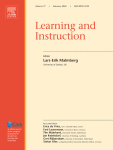Dialogic classroom talk in early childhood education: The effect on language skills and social competence

The first purpose of the present study was to examine the effect of dialogic classroom talk on children's language skills (i.e. oral communicative competence and receptive vocabulary knowledge). The second purpose was to examine the effect of this type of classroom talk on children's social competence (i.e. theory of mind and social acceptance). A total of 17 teachers and 311 children (aged 4–7 years) participated in this study. Eight teachers participated in an 8-week intervention directed at dialogic classroom talk. Multilevel analyses revealed that the intervention had a significant effect on children's oral communicative competence. No significant effects were found on children's receptive vocabulary knowledge, theory of mind, and social acceptance. The results of this study indicate that dialogic classroom talk is beneficial for children's oral communicative competence. Further research is required in order to investigate how dialogic classroom talk might affect receptive vocabulary knowledge and social competence as well.
Year:
Organisation:
van der Wilt, F., Bouwer, R., & van der Veen, C.
Keywords:
Dialogic classroom talk, early childhood education, Language
Marginalized & Vulnerable group:
All
Topic:
Inclusive Pedagogy & Practices, Language of Instruction
Level of Education:
Early Childhood Education
Type of Resources:
Research & Policy Papers
Country/Region:
All, Africa, Arab States, Asia & the Pacific, Europe & North America, Latin America & the Caribbean
Language of Publication:
English